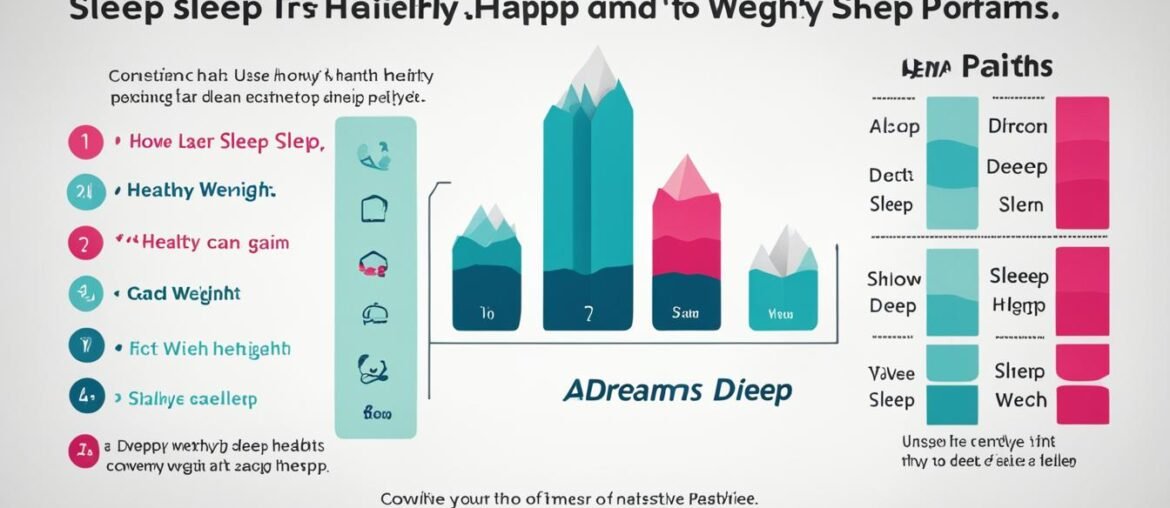Research has shown that sleep patterns have a significant impact on weight and body composition. Understanding the relationship between sleep and weight is essential for managing a healthy lifestyle. In this article, I will explore the effects of sleep quality, duration, deprivation, and disturbances on weight gain and obesity. We will also delve into the connection between sleep and metabolism, as well as discuss how improving sleep can aid in weight management (see my post here).
Key Takeaways:
- Poor sleep patterns can contribute to weight gain and obesity.
- Sleep deprivation leads to hormone imbalances that increase appetite and promote overeating.
- Restricted sleep duration is associated with a higher intake of high-calorie foods.
- Inadequate sleep in children increases the risk of childhood obesity.
- Obesity can negatively impact sleep quality and contribute to sleep disorders.
The Effects of Sleep Deprivation on Weight Gain
Sleep deprivation can have detrimental effects on the body’s hormone balance, leading to weight gain and an increased risk of obesity. When we don’t get enough sleep, our appetite-regulating hormones, such as leptin and ghrelin, become disrupted, causing an imbalance in appetite regulation.
Leptin is responsible for signaling feelings of fullness and satiety to the brain, while ghrelin stimulates hunger and promotes the desire to eat. When we’re sleep deprived, the production of leptin decreases, making it harder to feel satisfied after a meal. At the same time, ghrelin levels rise, driving cravings and increasing the likelihood of overeating.
This hormonal imbalance not only leads to an increase in appetite but also affects the body’s metabolism and energy expenditure. Sleep deprivation has been linked to deficiencies in growth hormone and elevated levels of the stress hormone cortisol. Both of these imbalances contribute to weight gain and hinder weight regulation.
Growth hormone deficiency, which can occur as a result of sleep deprivation, can impair the body’s ability to build and maintain muscle mass. This can lead to a decrease in metabolism and a greater propensity for weight gain.
Elevated levels of cortisol, the body’s primary stress hormone, can also contribute to weight gain. When cortisol levels are chronically elevated due to lack of sleep, it can lead to increased fat storage, particularly in the abdominal area (check out my post on lack of sleep here).
In addition to these hormone-related effects, sleep deprivation can also impair the body’s ability to efficiently metabolize food. Research has shown that inadequate sleep can lead to insulin resistance, meaning the body has difficulty regulating blood sugar levels. This can contribute to weight gain and the development of conditions such as type 2 diabetes.
Overall, the effects of sleep deprivation on weight gain are multi-faceted, involving hormone imbalances, appetite dysregulation, and impaired metabolism (check this post out). Prioritizing healthy sleep habits and ensuring an adequate amount of sleep each night is crucial for maintaining a healthy body weight.
Quote:
“Sleep deprivation disrupts the delicate balance of hormones that regulate appetite and metabolism, making weight gain more likely.” – Dr. Emma Johnson, Sleep Specialist
Effects of Sleep Deprivation on Hormones
| Hormone | Effect of Sleep Deprivation |
|---|---|
| Leptin | Decreased production; decreased feelings of satiety |
| Ghrelin | Increased production; increased appetite and cravings |
| Growth Hormone | Deficiency; decreased muscle mass and metabolism |
| Cortisol | Elevated levels; increased fat storage, particularly in the abdominal area |
The Impact of Sleep on Food Choices and Caloric Intake

When it comes to maintaining a healthy weight, sleep duration plays a crucial role in influencing our food choices and overall calorie intake. Restricted sleep duration has been associated with a greater tendency to select high-calorie foods and consume more calories, especially late at night.
Research has shown that individuals who do not get sufficient sleep often engage in less physical activity, which can be attributed to feelings of sleepiness and fatigue during the day. This reduced exercise further contributes to the imbalance between calorie intake and energy expenditure.
Moreover, sleep loss has been found to increase snack consumption and the intake of calories from snacks. When we are sleep-deprived, we are more likely to reach for convenient, high-calorie snacks as a quick energy boost. These dietary choices, coupled with reduced exercise, create an environment that promotes weight gain and the development of obesity.
“Getting enough sleep is essential for maintaining a healthy weight and making mindful food choices. When we lack adequate sleep, our decision-making processes are affected, leading to a higher likelihood of selecting high-calorie, unhealthy foods.”
To illustrate the impact of sleep on food choices and calorie intake, consider the following examples:
| Sleep duration | Habit | Calorie intake (late at night) |
|---|---|---|
| 8 hours | Eating a balanced dinner | Minimal or no late-night snacking |
| 5 hours | Eating a high-calorie dinner | Increased late-night snacking; consumption of high-calorie foods |
| 4 hours | Eating a high-calorie dinner | Frequent late-night snacking; consumption of large quantities of high-calorie foods |
This table highlights the correlation between sleep duration, food choices, and late-night snacking. As sleep duration decreases, individuals are more likely to opt for high-calorie foods and consume a higher number of calories late at night.
The image above visually represents the concept of late-night snacking and its impact on calorie intake, emphasizing the importance of sleep in influencing our food choices and overall weight management.
Sleep and Obesity in Children
Sleep duration in children has a profound impact on their overall health and development, including their weight. Insufficient sleep in children can contribute to hormonal changes, increased daytime fatigue, and poor diet quality, all of which can increase the risk of childhood obesity.
Hormonal Changes
Lack of adequate sleep in children can lead to disruptions in appetite-regulating hormones, similar to those seen in adults. These hormonal imbalances can increase feelings of hunger and alter satiety signals, leading to overeating and weight gain.
Increased Daytime Fatigue
Children who do not get enough sleep often experience increased daytime fatigue, which can negatively impact their daily activities and result in decreased physical activity. Reduced exercise levels can contribute to weight gain and the development of obesity.
Bedtime and Diet Quality
The timing of a child’s bedtime can also influence their diet quality and food choices. Research suggests that children with later bedtimes tend to consume more nutrient-poor foods and have poorer overall diet quality. These dietary habits can further contribute to weight gain and obesity.
To effectively address and prevent childhood obesity, it is essential to prioritize healthy sleep habits in children. Ensuring children get adequate sleep duration, establishing consistent bedtimes, and promoting a nutritious diet are crucial steps in promoting their overall well-being and healthy weight management.
The Bidirectional Relationship Between Sleep and Obesity

Obesity and sleep have a complex relationship, with each influencing the other in a bidirectional manner. Not only are individuals who are overweight or obese more likely to experience sleep disturbances, but obesity itself can directly impact sleep quality and contribute to the development of sleep disorders.
Sleep disturbances: Insomnia and trouble sleeping are commonly reported by individuals who are overweight or obese. Excess weight can lead to sleep fragmentation, characterized by frequent awakenings during the night, which can disrupt the overall sleep architecture.
Physical effects of obesity on sleep quality: Obesity can result in physical changes that affect sleep, such as increased risk of obstructive sleep apnea (OSA), gastroesophageal reflux disease (GERD), depression, asthma, and osteoarthritis. These conditions can further impair sleep quality and exacerbate sleep-related symptoms.
For example, OSA is a condition characterized by repeated partial or complete blockages of the upper airway during sleep, leading to interruptions in breathing and fragmented sleep. It is more prevalent among individuals with obesity due to the excess fat deposits in the throat and neck region that can obstruct the airway during sleep.
GERD, a chronic digestive disorder that causes acid reflux and heartburn, is also more common in individuals with obesity. The symptoms of GERD, such as heartburn and regurgitation, can interrupt sleep and result in poor sleep quality.
Depression is another condition that has been linked to both obesity and sleep disturbances. The relationship between obesity and depression is complex and bidirectional, with each condition increasing the risk of the other. Depression can lead to sleep disturbances, including insomnia, hypersomnia, or changes in sleep architecture.
Asthma, a chronic respiratory condition, is also more prevalent in individuals with obesity. Asthma symptoms, such as wheezing, coughing, and shortness of breath, can disrupt sleep and contribute to sleep deprivation and daytime sleepiness.
Osteoarthritis, a degenerative joint disease, can cause pain and joint stiffness that interfere with sleep. The discomfort experienced by individuals with obesity due to excess weight can worsen the symptoms of osteoarthritis, further disrupting sleep quality and duration.
This bidirectional relationship between sleep and obesity highlights the importance of addressing both factors when managing weight and overall health. Improving sleep quality and duration can contribute to weight management efforts, while addressing obesity-related physical effects on sleep can improve overall sleep health.
By understanding the bidirectional relationship between sleep and obesity and taking steps to prioritize healthy sleep habits, individuals can improve their overall well-being and enhance their weight management efforts.
Conclusion
Through numerous studies, it has become clear that sleep plays a significant role in weight and body composition. Poor sleep patterns, including inadequate duration, low quality, and disturbances, have been linked to weight gain and obesity. On the other hand, prioritizing healthy sleep habits, such as improving sleep quality and duration, has been associated with better weight management.
While more research is needed to fully understand the mechanisms behind the relationship between sleep and weight, the existing evidence highlights the importance of maintaining healthy sleep patterns for maintaining a healthy weight. Sleep duration and quality are crucial factors that should be prioritized in weight regulation efforts.
By focusing on optimizing sleep duration, improving sleep quality, and addressing sleep disturbances, it is possible to support weight management goals. Understanding the impact of sleep on weight and body composition enables individuals to make informed decisions regarding their sleep habits, ultimately leading to better overall health and well-being (see my post here).




